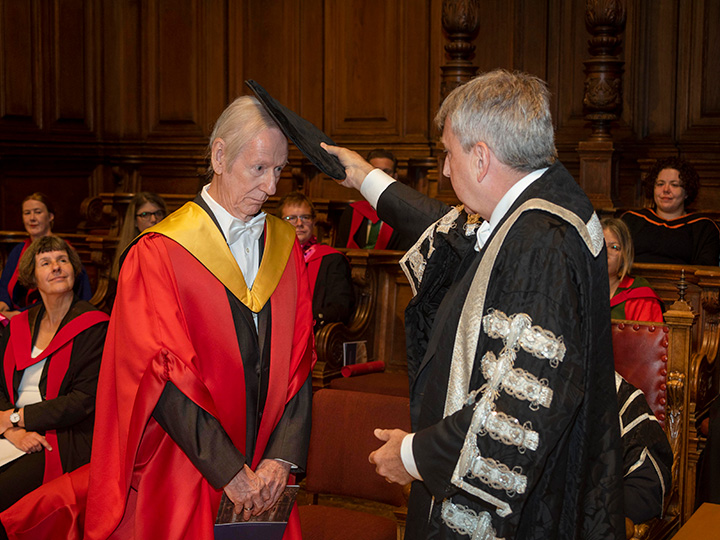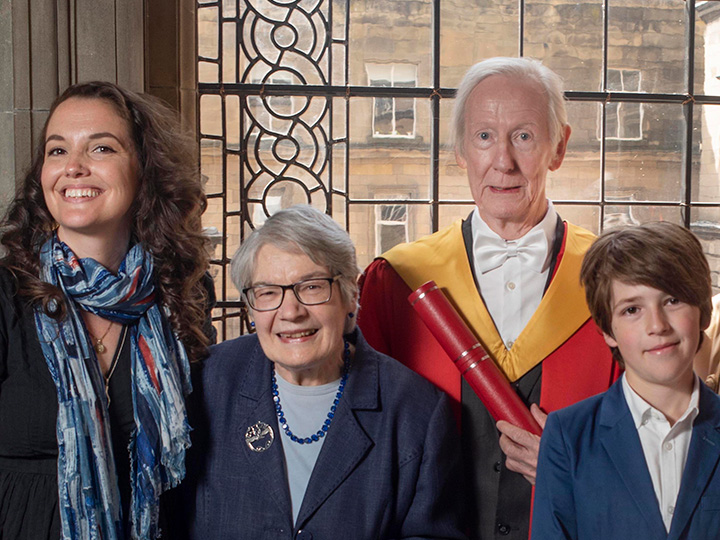

In July, Professor Carl Lindahl, an internationally recognized folklorist at the University of Houston, traveled to Scotland to receive a Doctor honoris causa at the University of Edinburgh. Professor Lindahl’s specialties include folk narrative, medieval folklore, folktales and legends, festivals and celebrations, folklore fieldwork, traditional healing strategies, and ways in which folk cultures seek and exercise covert power.
FORWARD spoke with Dr. Lindahl to learn more about the recent honor in Edinburgh, his collaborations with UH students, and his research and teaching in Houston, Greece, and beyond.
Some of your work has explored the regional cultures of Appalachia, Texas, and the Ozarks. I’m curious how you decided to focus on those regions.
I came to the University of Houston in 1980 as a medievalist, but my best friend from graduate school was living in Louisiana, and he was a Cajun, brought up speaking French. He was my closest friend geographically; I became a godfather and essentially synthetic extended family in this Cajun family. And it was about ten years before I started to write about it. I went on then to rediscover the lore of my grandmother, who was the person who got me into folklore, because she told me stories when I was a kid, and I never forgot these stories—I was entranced by them. She never went to high school, but she was one of the best-read, best-informed persons I’ve met, and a terrific storyteller. This is what got me into the aurality of it all. I reengaged her about growing up—and although she had never seen it, her father had come from the mountain area of Virginia and had left there after the Civil War. So I got a fellowship to the University of Virginia working in an area not far from where her dad grew up in the 1850s, and started interviewing people to connect their lore to my grandmother’s through stories that I’d previously experienced only in books and archives. So I was going back into my past.
In the spring, you taught a course on American Folklore. And for the American Folklore Society’s annual meeting this October, you’ve organized a panel with three UH students (MFA candidates Stacy Nigliazzo and Sara Kaplan-Cunningham, and undergraduate Victoria Blake). How did that panel come into existence?
The seminar begins with the assumption that each of you taking this course is the world's leading expert in your own folklore. This course is about a discipline. It's about a body of material. But it’s foremost about you. At least for me, there's nothing more fundamentally important in folklore than recognizing that importance from a personal perspective. Before I ask people to write on this assignment, I say don't talk to any relatives, do this from your own memory. You are a folk being. Just follow the thread of your memories to see what you can do with that. The second assignment is then to go out and record people. Folklore is arguably the most universal experience but also the most intimate and personal. Folklore is community culture and it's about not only who we are as a community, but how you engage your roles in a community, how you deal with each other day in and day out. So the dynamics of older and younger, the dynamics of gender, all these sorts of things are inscribed in these stories that you learn and they become after a while, your community story. The papers in this panel are all excellent explorations of legendary and ritual stuff from the authors’ experience. So I picked the panel title, “Belief and Bonding: Three Insider Explorations,” because all three student papers were about the experiences of individuals and the ways in which sometimes, inside the group, you hear both individual and differential voices, complementarily, in concert.
What was it like to receive the honorary doctorate at the University of Edinburgh?
It was terrifying. Most of the pictures of me showed me in utter terror. One shows
somebody hitting me with a cap that's supposed to be the cap of John Knox, the famous
religious extremist fanatic philosopher of predestined doom. That's the legend I learned
afterwards. Not all legends are false, but this one is false. It was a great honor;
but the honor was really the people it came from and the people who came over, like
Carolann Madden [PhD ’22, Creative Writing & Literature]. I had a Fulbright there
as a visiting professor in 2004-5, but they gave me that degree not for my research
on Scotland, but for the survivor-to-survivor interview projects I began creating
in response to Hurricane Katrina right after returning to UH from Scotland. Being
with the Scots trained me a lot about what to do in Katrina, because Edinburgh has
a folklore program that’s always been responsive to its folk. The folk aren’t the
raw material for your academic biography. They are what it’s all about, and this is
a program that, for example, took the part of the Traveller People in Scotland, fought
for the rights they’d earned but previously never possessed. The individuals who work
in folklore tend to be socially conscious, but particularly from a community consciousness
level. Folklore is a survival strategy, and individuals who get to know that, then
have to honor that strategy by amplifying the efforts these communities make. You
are saying: the more you listen to them, the more they are recognized as the leading
agents in their own survival, and not as the objects of our curiosity or condescension,
the better the world will be.